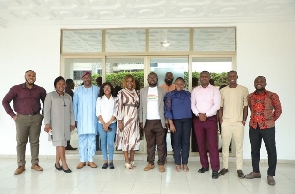Founder and Executive Director of Human Rights Reporters Ghana-NGO (HRRG) Joseph Kobla Wemakor has benefited from a three-day capacity building workshop on civic space protection organized for leaders of ten (10) Ghanaian civil society organizations (CSOs) who were part of the first cohort of beneficiaries of the Civic Space Resource Hub for West Africa project.
The workshop which aims at equipping the participants with rich skills for influencing state policies and reclaiming the shrinking civic space was organized by the West Africa Civil Society Institute (WACSI).
It was held from 7th to 9th March 2023 in Accra, Ghana.
The ten selected CSOs which benefited from the workshop were Norsaac, Centre for Public Interest Law, Centre for Democratic Development – Ghana, WERENGO-Ghana and the Human Rights Reporters Ghana (HRRG).
The rest were the West Africa Drug Policy Network (WADPN), Parliamentary Network Africa -Ghana, GenCED Ghana and CSIF-Ghana.
The Ghanaian civic space has come under barrage of criticism in recent times over safety as far as threats such as arbitrary arrest of journalists, excessive use of force against protesters and civic actors among others are concerned.
At the sub-Saharan state, the picture is however, not different as the past years have seen major civic space threats which warranted the attention of the CIVICUS Monitor into its ranking as Narrowed.
It is under this backdrop, the organizer, WACSCI has staged the workshop to enlighten and empower the participants who are leaders of the ten vibrant Ghanaian Civil Society Organizations (CSOs) in the country on the need to be informed in order safeguard themselves from further attacks posed to them during course of their work within the civic space.
Head of the Policy Influencing and Advocacy Unit at WACSI, Omolara Balogun stressed the need for civic actors to widen their scope of information, gather enough data and upgrade themselves regularly in order to be well positioned to contribute their quota towards the growth of the civic space and promote open societies.
“This training is very important to CSOs because it seeks to enhance their institutional and operational capacity so that they can effectively work on civic space, human rights, freedom of expression and regulatory compliance,” she said.
Omolara furthered that the training also offered the participants additional skills, knowledge, and information on how they can strengthen the financial and digital resilience of their organisations.
Executive Director of Nigeria Network of NGOs, Oyebisi Babatunde Oluseyi, who conducted the training, schooled the participants on the need to collaborate with government and state institutions as far as working in the civic space is concerned.
He underscored the need for the participants to be disciplined, gather information of the setting in which they function and be abreast with legal, political and social factors that affect their work.
The participants expressed their heartfelt gratification to have partake in a training which falls under the Civic Space Protection pillar of the project.
Excited Joseph Kobla Wemakor could not hide his joyful feeling knowing the workshop has achieved its desired purpose of perfecting his advocacy skills to be well positioned as an advocate for the promotion, protection and fulfilment of human rights.
He said, “I believe my knowledge gaps on effective advocacy coupled with the acquisition of the right techniques have now been closed owing to the rich training I’ve received out of the important topics covered backed by an excellent delivery put up by the workshop facilitator.”
Mr. Wemakor equally participated last year in the Digital Clinic for Civic Actors CSR-Hub for West Africa project organized by the Spaces for Change (S4C), a non-governmental organization, located in Lagos, Nigeria in collaboration with Interactive Initiative for Social Impact (Dataphyte).
The CSR-Hub for West Africa seeks to strengthen the capacity of CSOs working to expand civic space and promote open societies in West Africa.
Regional News of Thursday, 16 March 2023
Source: Joseph Wemakor, Contributor

















